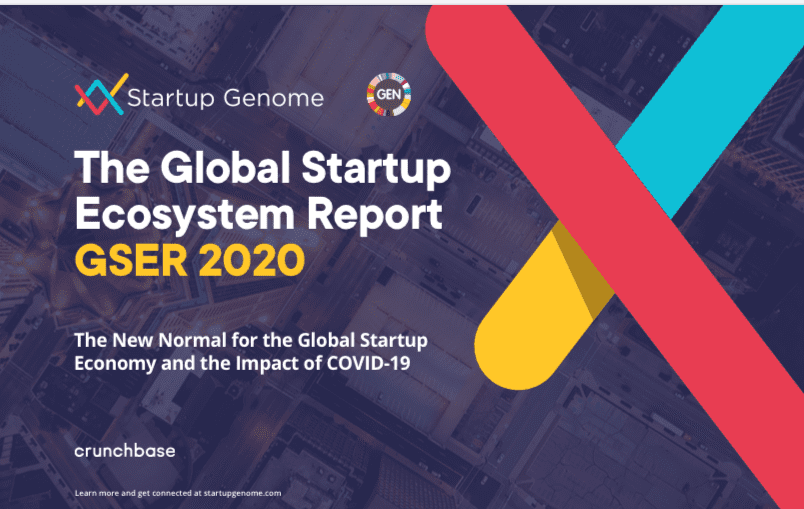Last year, Startup Genome’s Global Ecosystem Report put the Miami metro area on the map for the first time. This year, we are again on the global map in a new report by Startup Genome, together with the Global Entrepreneurship Network, that ranks top ecosystems on a number of metrics, including performance, funding, connectedness, talent and knowledge.
Hot off the press: Miami ranked 31st in a 5 way tie, considered a runner-up for the “Top 30,” in the Startup Genome Global Startup Ecosystem Report 2020 released Thursday. That’s 5 rankings down from last year, when we ranked 26th. As a runner-up ecosystem, Miami has identifiable gaps such as in Connectedness and Talent that, if closed, along with focusing on strengths, can help catapult them into the top 30 startup ecosystems, the report said.
Startup Genome’s analysis includes detailed looks at nearly 300 ecosystems and ranks 140 of them. Last week, it released a deeper dive into Miami’s opportunities and challenges with the Knight Foundation.
A few of its findings about Miami in Thursday’s Global Startup Ecosystem Report 2020:
- Miami is in the top 15 North American ecosystems for funding and overall performance.
- Life sciences and ed-tech were again highlighted as sectors of strength.
- According to the report, early stage funding totaled $519 million, besting the global average of $431 million.
- The median seed round was $725K (global average $494K) and Series A was $1.8 million (global average $2.7 million).
- Miami is No. 4 in the U.S. for Latino entrepreneurship and has one of the highest percentages of immigrant-owned businesses, the report said.
Globally, the report noted that in 2013, only four ecosystems produced unicorns or billion-dollar exits. Today, over 80 ecosystems have done so, including Miami with several to boast.
“This is the time for policymakers, community leaders, and foundations to double down on their support of local startups — the #1 engine of job creation and economic growth,” said JF Gauthier, founder and CEO of Startup Genome. “The Global Startup Ecosystem Report is the foundation of global knowledge where we, as a network, come together to identify what policies actually produce economic impact and in what context.”
Here are some more key findings, from the report:
- The top five global startup ecosystems remain the same, although with some movement within them. Silicon Valley maintains its #1 position. New York remains at #2, although now London is up and tied with it. Beijing is at #4 and Boston is at #5. Tel Aviv and Los Angeles follow, tied at #6.
- The 2020 rankings have seen the growth of many R&D powerhouses: those ecosystems growing largely building upon their strengths on research and patent production. Tokyo (#15) and Seoul (#20) are the prime examples of this, with both ecosystems scoring the max in the Knowledge Factor — a measure of R&D activity. Shenzhen (#22) and Hangzhou (#28) also fit this ecosystem archetype.
- The Rise of Asia is more visible this year, with 30% of the top ecosystems coming from the region, compared to 20% in 2012. Of the 11 new ecosystems that made it to the top ecosystems list, six are out of Asia-Pacific.
- There are two new entrants in the top 20 global startup ecosystems: Tokyo(#15) and Seoul(#20). New entrants among the top 30 include Shenzhen (the advanced manufacturing hub, at #22), Hangzhou(home to Alibaba, at #28), and São Paulo (#30, returning to the top ecosystems list after falling off in 2017).
- For the first time, Startup Genome also ranked the top 100 emerging ecosystems. Tampa Bay ranked 21st. Orlando ranked in the top 50 and Jacksonville ranked in the top 90.
Download the full report here.
Follow @ndahlberg on Twitter and email her at [email protected]
Read more on Refresh: Startup Genome report offers ecosystem insights on the way forward
- Human ingenuity, inspiration, a call to action: Miami Tech Talent Coalition takes the stage at eMerge Americas - April 24, 2024
- Miami Tech Month, where developers get their own conference, VCs take the stage, and anything is POSSIBLE - April 23, 2024
- Full circle moment for Johanna Mikkola, the new CEO for Tech Equity Miami - April 22, 2024





